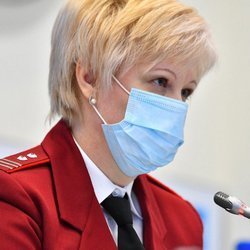Incidence of COVID-19 in Tatarstan on decline, but situation with SARS and influenza 'not encouraging'
'This year's flu, unlike last season, is extremely alarming for us'
In Tatarstan, the incidence of coronavirus continues to decline. over the past day, 185 new cases of infection have been detected in the republic — the last time this number was less only in early November. A total of 40,229 cases of COVID-19 have been registered in Tatarstan since the beginning of the pandemic.
“We have been noticing a slight downward trend in the incidence [of coronavirus] since the 47th week<...> Over the previous week, the downward trend continues, and the incidence rate is 8% lower than the previous week," Lyubov Avdonina, the deputy head of the Department of Rospotrebnadzor for the Republic of Tatarstan, said at the traditional Friday conference.
The Omicron strain, which is rapidly spreading around the world and has already penetrated into Russia, has not been identified in Tatarstan. Since November 29, Kazan International Airport has been conducting random testing of individuals who arrive from the countries where cases of infection with the new mutation have already been registered. Seventy-one people have been examined, all the results are negative, Avdonina said.
Rospotrebnadzor is “not happy” about the situation with SARS and flu. The incidence rate has turned out to be 11% higher than the indicators of the previous week at once, and the epidemic threshold has been exceeded almost 1,7 times, mainly due to adults and schoolchildren, Avdonina noted. Last week alone, 58 cases of influenza infection were detected in the republic.

As in the case of coronavirus, vaccination is designed to fight the flu. In Tatarstan, for example, 60% of children have already been vaccinated against it.
Vaccination against coronavirus is also continuing. According to the speaker, 80% of the population can be vaccinated in Tatarstan by the beginning of 2022, provided that the current vaccination rates remain. Thus, by the New Year, the republic can achieve collective immunity to COVID-19. So far, it is estimated at 72%. About 300,000 more Tatarstan citizens need to be vaccinated.
According to Vladimir Zhavoronkov, the deputy minister of healthcare of the Republic of Tatarstan, head of the Kazan Health Department, 2,189,735 people have already been vaccinated against coronavirus in the republic, of which 1,855,122 citizens have completed the vaccination course. The daily increase was 24,346 vaccinated.
Complications after the Republican New Year Tree party are not expected
The New Year is rapidly approaching, and Tatarstan residents are increasingly concerned about how they will celebrate it in conditions of the Covid-19 restrictions — restaurants are still not allowed to work at night, and it is possible to get to places of mass stay of people only by QR codes. Avdonina promised to answer what the format of the New Year holidays will be in a week.
“The situation in our country does not allow us to make any changes to the resolution yet. Therefore, we are still observing today. In about a week, if the situation persists for the new coronavirus infection (although, I say again, SARS with influenza is added to it, which is not quite favourable, and this is extremely alarming to us), therefore, a decision will be made on the totality of all signs (this is both morbidity and vaccination)," Avdonina said.
Tatarstan residents are also concerned about the question of why, if children are exposed to COVID-19, it was decided to hold the Republican New Year tree for 8,000 people. However, Rospotrebnadzor assures that there is no danger for young residents of the republic at all.
“After all, coronavirus infection is for children, it is less, so to speak, typical than, for example, the flu and than for adults. We are currently working on the format of New Year's holidays, including for children. Fortunately, children are suffering less from the new coronavirus infection, we talked about this. About five times their incidence is lower than among adults," Avdonina drew attention.
According to her, there is no increase in the incidence of coronavirus among children in Tatarstan. Only one hospital has been deployed for them in the republic, and it is “not filled with a large percentage of beds”. The flu is much more dangerous for children, Avdonina assures.
“The New Year Tree is big, for eight thousand [people], it will be, but not for eight thousand simultaneously. That is, its holding is divided into two parts, and we already held teh New Year Tree party in this format last year. We did not observe any complications of the situation after this New Year Tree party," the speaker reminded.
They do not see in Tatarstan the need to transfer children to remote education. Education in schools will continue in full-time format.
“Today there are 280 classes disintegrated. This is about 7,000 children. These are mainly Kazan, Naberezhnye Chelny, Almetyevsk, Nizhnekamsk, Aznakaevo, Tukayevsky district and several others, there are also isolated cases there," Avdonina said.
“Passenger traffic is trending towards recovery”
Meanwhile, passenger traffic has begun to recover on public transport, which collapsed by almost 23% in the first week after the introduction of QR codes. It was the hardest week for passengers and carriers, said Acting Deputy Head of the Ministry of Transport of Tatarstan Aleksey Sidorov.

He explained such dynamics with indulgences, in particular, the opportunity to use a bus, trolleybus, tram and the metro when the first component of the vaccine is injected.
At the same time, there are still “certain difficulties”. The carriers, according to Sidorov, most often complain about the negativity on the part of passengers, difficulties with informing them, especially elderly passengers, and the peculiarities of presenting QR codes. At the same time, fewer complaints have been received from the residents of the republic themselves — more than a thousand appeals have been received from them since the beginning of the QR codes on public transport.
Most of the complaints concerned blocked transport cards. At the moment, 607 cards remain blocked, while they started with about 140 thousand throughout the republic, Sidorov said.
The situation on public transport is controlled by the authorities of Tatarstan, the representative of the Ministry of Transport of the Republic of Tatarstan assured.